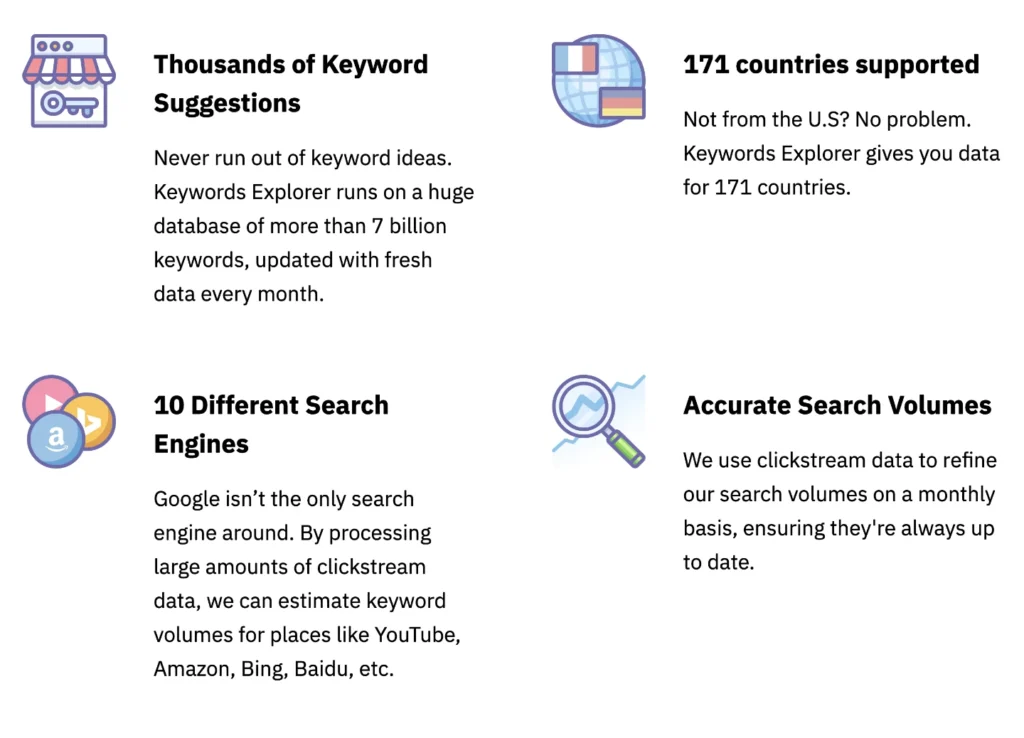Introduction
Ahrefs, you pour your heart into a blog post. You hit “publish,” and then… silence. A few days later, you check your traffic, hoping to see a spike. Instead, you find a flatline. Sound familiar? You know you need a better strategy, but the world of SEO tools feels overwhelming.
Let’s change that narrative right now.
Forget seeing Ahrefs as just another complicated software. Instead, think of it as your digital compass. This powerful tool doesn’t just give you data; it gives you direction. It reveals what your audience truly desires and how you can give it to them. In this guide, we will walk through the core functionalities of Ahrefs. Moreover, you will learn how to dissect your competition, discover golden keyword opportunities, and track your own climbing success.

Firstly, What Exactly is Ahrefs?
Simply put, Ahrefs is an all-in-one SEO toolkit. Businesses and marketers use it to improve their search engine rankings and attract more organic traffic. While it boasts a vast array of features, we will focus on the core pillars that deliver the most value. Then think of it as your central command for keyword research, competitor analysis, and site auditing.
If you want to read about RankMath, click here.
Now, let’s roll up our sleeves and dive into the practical steps.
How to Use Ahrefs for Powerful Keyword Research
Keyword research forms the bedrock of any successful SEO strategy. You are essentially learning the language your customers use to search. Ahrefs turns this from guesswork into a science.
1. Start with the Keywords Explorer.
Firstly, navigate to the “Keywords Explorer” tab. Then this is your mission control for all things keyword-related. Type in a broad seed keyword related to your business, like “vegan recipes.”
Immediately, Ahrefs presents you with a treasure trove of data. You see the keyword’s search volume, its difficulty to rank for (Keyword Difficulty or KD), and even its click-through rate potential. This dashboard provides an instant snapshot of the competitive landscape.
2. Analyze the “Parent Topic” for Context.
Secondly, Ahrefs cleverly groups keywords under “Parent Topics.” This feature helps you understand the core intent behind a search. Instead of targeting a hundred vague terms, you can focus on the main topic that truly matters to users. Consequently, you create content that comprehensively answers a user’s query.
3. Mine the “Matching Terms” Report for Gold.
Next, click on the “Matching Terms” report. This is where the magic happens. Ahrefs generates thousands of related keyword ideas. You will find questions (“how to make vegan cheese”), long-tail phrases (“easy vegan dinner recipes for beginners”), and comparisons (“almond milk vs oat milk”).
Furthermore, you can sort these keywords by low “Keyword Difficulty” and high “Volume.” This simple filter uncovers hidden opportunities, topics with decent search traffic that your website can actually rank for, even without immense authority.
How to Use Ahrefs for Unbeatable Competitor Analysis
Your competitors have already done much of the hard work. They have created content that resonates with your shared audience. With Ahrefs, you can learn from their successes and, more importantly, their failures.
1. Use Site Explorer to Enter Their Domain.
Additionally, Head to “Site Explorer” and type in your competitor’s website URL. The “Overview” tab provides a staggering amount of intelligence at a glance. Pay close attention to their “Top Pages.” Then this report shows you which of their content pieces are driving the most organic traffic right now.
2. Identify Their Winning Content.
Secondly, scroll through their “Top Pages.” You will likely find surprises, perhaps an old blog post you never considered is bringing them thousands of visitors monthly. Furthermore, this is your content gap. These are the topics your audience demonstrably cares about, and you now have a clear list of ideas.
3. Don’t Forget to Look at Their Backlinks.
Thirdly, similarly, you can click on the “Backlinks” report to see who is linking to your competitor’s site. Understanding their backlink profile reveals their promotional strategy. Then, you can reach out to these same websites for your own content, a tactic often called “competitor backlink gap analysis.”
How to Use Ahrefs for a Flawless Site Audit
Technical SEO issues can sink a great website. Fortunately, Ahrefs makes finding and fixing these problems straightforward.
1. Firstly, Set Up and Run the Site Audit Tool.
Navigate to “Site Audit” and configure a new project for your website. The tool will crawl your site, just like a search engine bot, scrutinizing every page for errors.
2. Secondly, Prioritize the “Critical Errors.”
Once the crawl finishes, you will see a list of issues. Always address the “Critical errors” first. These are major problems like broken pages (404 errors) that severely hinder your SEO performance. Fixing them often provides a quick and significant boost.
3. Thirdly, Monitor Your Improvement Over Time.
Finally, run the site audit regularly. This allows you to track your progress and catch new errors before they impact your rankings. Consistent maintenance keeps your site healthy and visible.
How to Use Ahrefs for Tracking Your Rankings
What gets measured gets managed. Ahrefs allows you to track your keyword rankings daily.
1. Set Up a “Rank Tracker” Project.
Firstly, go to “Rank Tracker” and create a new project for your domain. Add the keywords you are actively targeting. The tool will then monitor your positions in Google’s search results for those terms.
2. Interpret the Data for Insights.
Secondly, you can view your tracking in a simple graph. When you see a keyword’s rank improve, you know your efforts are paying off. Conversely, if a keyword drops, you can investigate. Perhaps a competitor updated their content, or a new technical issue appeared on your site.
Bringing It All Together: Ahrefs
Then, ultimately, Ahrefs is more than a dashboard of numbers. It is a strategic partner. You start by discovering what to write about through keyword research. Then, you ensure your website is technically sound with a site audit. After you publish, you analyze your competitors for inspiration and track your own rising rankings.
The goal is not to use every feature at once. Start small. Master one report, like the “Matching Terms” in Keywords Explorer. Then, gradually incorporate another. Before long, you will move from guessing to knowing, from hoping for traffic to actively building it.
Ahrefs Frequently Asked Questions (FAQ)
Q1: Is Ahrefs suitable for complete beginners?
Absolutely. While the interface can seem dense initially, Ahrefs provides excellent educational content through its blog and Academy. Then, start with the basic features we have outlined, and you will build confidence quickly.
Q2: How does Ahrefs differ from other SEO tools like SEMrush?
Both are industry leaders. Ahrefs is often praised for its massive backlink index and intuitive keyword data. SEMrush often shines in its advertising and PPC features. Moreover, many professionals use both, but for deep SEO backlink analysis and keyword research, Ahrefs is a top choice.
Q3: What is the cost of an Ahrefs subscription?
Ahrefs is a premium tool with several pricing tiers. They typically offer a Lite plan around $99/month, a Standard plan around $199/month, and more advanced plans for agencies and large enterprises. They also provide a 7-day trial for a small fee, which is a great way to test the platform.
Q4: Can I use Ahrefs for local SEO?
Yes, you can. The Keywords Explorer enables you to specify a particular country and even a city, which is particularly crucial for local businesses. Moreover, you can effectively track local keyword rankings and analyze local competitors.
Q5: How accurate is Ahrefs’ data?
Ahrefs’ data is an estimation, but it is widely considered one of the most accurate and reliable in the industry. It uses sophisticated algorithms and a massive web crawl to provide its metrics. While the exact search volume might vary, the relative data (which keyword is more popular than another) is extremely valuable for making informed decisions.
